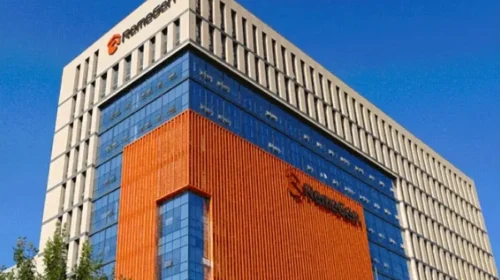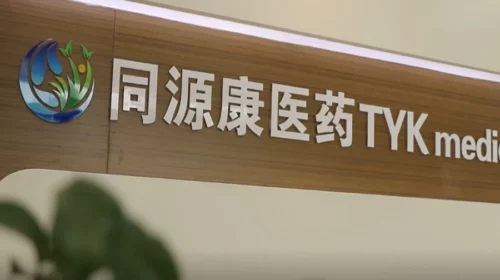Junshi narrows its losses but delivers no cure for share price woes

The drug maker boosted sales of its core anti-cancer product in the first half of the year and reined in its research budget under a reform-minded CEO, but revenue momentum lags the pace of leading rivals
Key Takeaways:
- Junshi Biosciences has made more than 9 billion yuan in losses in its 12-year history and its share price is nearly 90% down from a 2021 peak
- The flagship product toripalimab has been approved for a growing number of cancers and is the sole or leading treatment in China for some conditions
By Molly Wen
Revenue is rising, losses are shrinking, and an efficiency drive launched by a new CEO has slashed R&D costs. This earnings report sounds like a good prescription for pain relief, but investors pounded the stock anyway.
Shanghai Junshi Biosciences Co. Ltd. (1877.HK; 688180.SH) published its half-year results at the tail end of the Hong Kong earnings season, allowing for comparisons with other leading Chinese makers of innovative drugs. Viewed from this angle, the results look less positive.
By revenue, Junshi is lagging the other three Chinese developers of PD-1 immunotherapy drugs – Hengrui Pharmaceuticals (600276.SH), BeiGene (BGNE.US; 6160.HK; 688235.SH) and Innovent Biologics (1801.HK).
Junshi’s revenues rose 17% to 786 million yuan ($111 million) in the first half of the year, off the pace compared to its industry rivals. The rising income was driven by its core product, toripalimab, which brought in 671 million yuan in Chinese sales in the six months, about 50% more than the same period a year earlier. Toripalimab, sold under the brand name Tuoyi, was the first home-grown PD-1 product to get Chinese sales approval in 2018 but intense competition since then from rival drugs has dragged on sales growth.
Faced with a slumping share price, the company overhauled its management early this year, installing its former head of global R&D, Zou Jianjun, as CEO. She launched a drive to rationalize operations with an emphasis on efficiency and returns, focusing the research budget on the most promising drugs under development. The measures made a mark on the half-year earnings, where R&D expenditure tumbled 42% to 546 million yuan from the year-earlier period. R&D outlay had risen as high as 2.38 billion yuan in 2022.
With revenues growing and research costs contained, Junshi was able to limit its net loss, which shrank 35% to 645 million yuan in the first half. But the shift is not coming quickly enough for investors, who are eager to see profits on the horizon after the biotech racked up more than 9 billion yuan in losses since its launch in 2012. The stock price has fallen nearly 90% from its peak of HK$97 in February 2021 and is now hovering around HK$10.
The earnings report highlighted a reliance on toripalimab sales, which could be a concern for investors. And the Junshi turnover pales in comparison with growth of more than 20% from Hengrui, BeiGene and Innovent, on revenues of 13.6 billion yuan, 12 billion yuan and 3.95 billion yuan respectively. In the first session after Junshi’s earnings release, the company’s stock fell 8.7%.
Junshi has two other products on the market aside from toripalimab, an oral Covid drug and a treatment for arthritis and psoriasis. It did not disclose the sales of these two products, but figures on their hospital take-up provide a clue. The products, Mindewei and Junmaikang, have been accepted by more than 2,300 hospitals and 243 hospitals respectively, while toripalimab is sold to twice as many medical institutions across China.
Toripalimab has quickly established itself as Junshi’s flagship product with approval for 10 conditions, in some cases as an exclusive or leading treatment. Six conditions treated by the drug are covered under China’s national health plan, after the company had three new indications included in the scheme in the first half of the year. Junshi‘s core drug is the only PD-1 monoclonal antibody covered by the Chinese health scheme for use against melanoma.
The drug was also approved in June this year to treat an aggressive type of breast cancer, which could boost sales in the future. Toripalimab is injected as a first-line treatment of recurrent or metastatic triple-negative breast cancer (TNBC) along with a shot of paclitaxel, a type of chemotherapy. The company said its toripalimab was the first such drug approved for primary treatment of the condition in China. New cases of breast cancer in China average about 357,000 a year, with about 10% to 15% being TNBC, a particularly virulent form of cancer that is hard to eradicate and has a high recurrence rate.
Next milestone
Junshi has also been making headway in the United States, where toripalimab was approved for use against nasopharyngeal cancer in October last year. It was the first China-developed drug in its class to get the green light from U.S. drug regulators and went on the market there from January through Coherus (CHRS.US), one of the Chinese company’s U.S. partners.
It was certainly a milestone, but the treatment potential in the United States is limited, with only about 2,000 new cases of nasopharyngeal cancer there each year. In July, Coherus also sold the Canadian drug rights for toripalimab to Apotex, a Canadian pharmaceutical company, for a $6.25 million upfront payment and a maximum milestone payment of around $37.65 million.
Back in in 2021, Coherus paid $150 million for the U.S. and Canadian rights to toripalimab, with an option for two other oncology drugs under development. The comparatively cheap price of the rights transfer deal could indicate waning confidence in the commercial prospects.
As for treatments in the pipeline, the company’s immunotherapy drug tifcemalimab warrants the most attention as a potential game-changer. The company said the drug is the first anti-BTLA antibody to have entered clinical trials, attracting attention in medical and scientific circles for its potential to fight cancer via the body’s B and T cells.
Junshi trades at a price-to-sales (P/S) ratio of about 6 times, lower than the 8 times for Innovent, which also sells PD-1 drugs. The company may need to boost sales and deliver more blockbuster products if it wants to restore investor confidence.
To subscribe to Bamboo Works free weekly newsletter, click here






